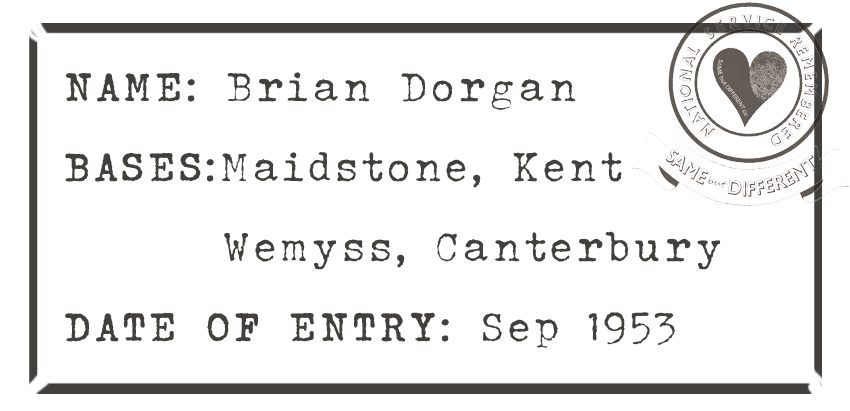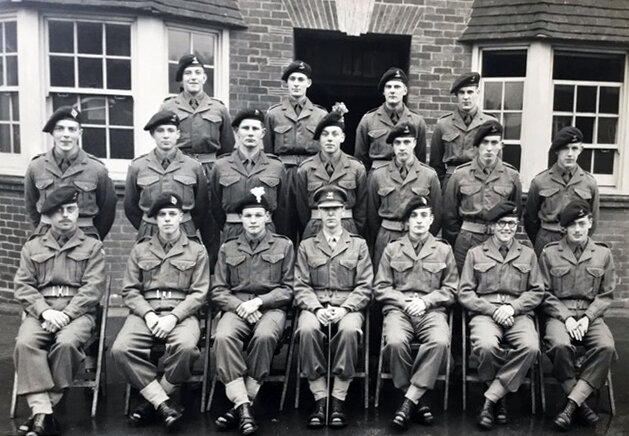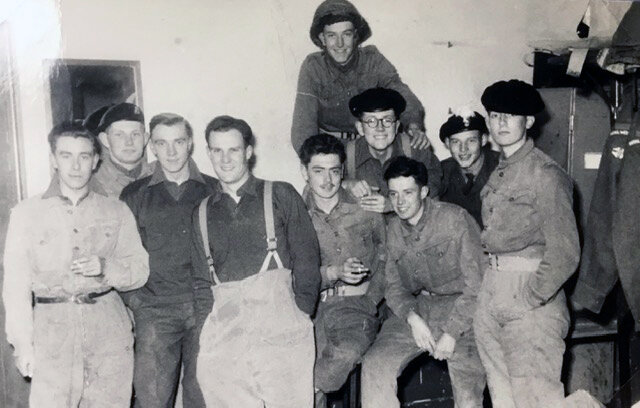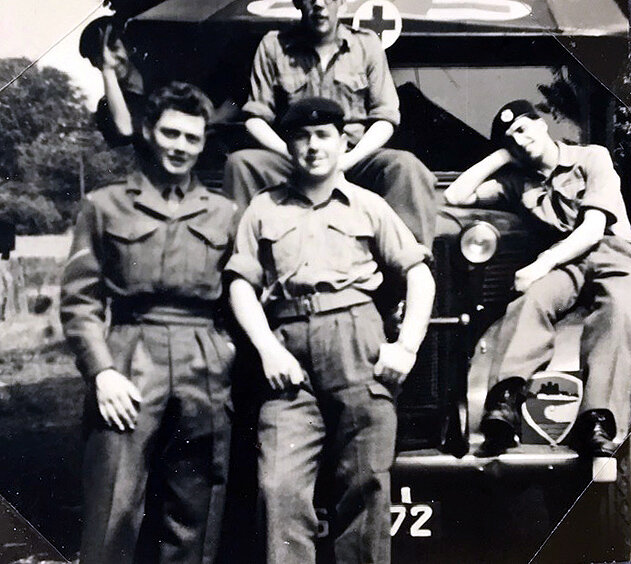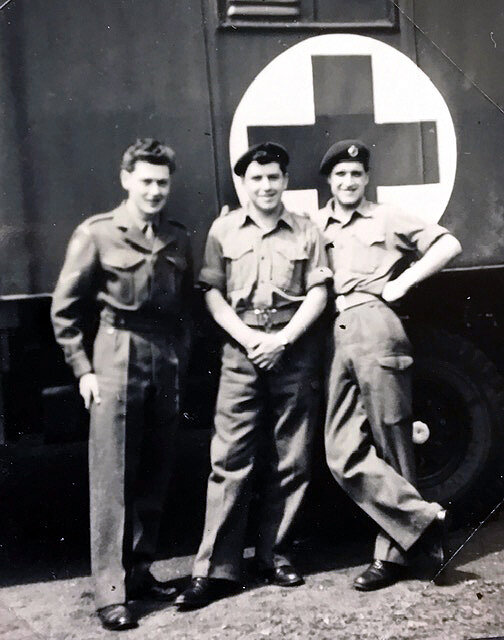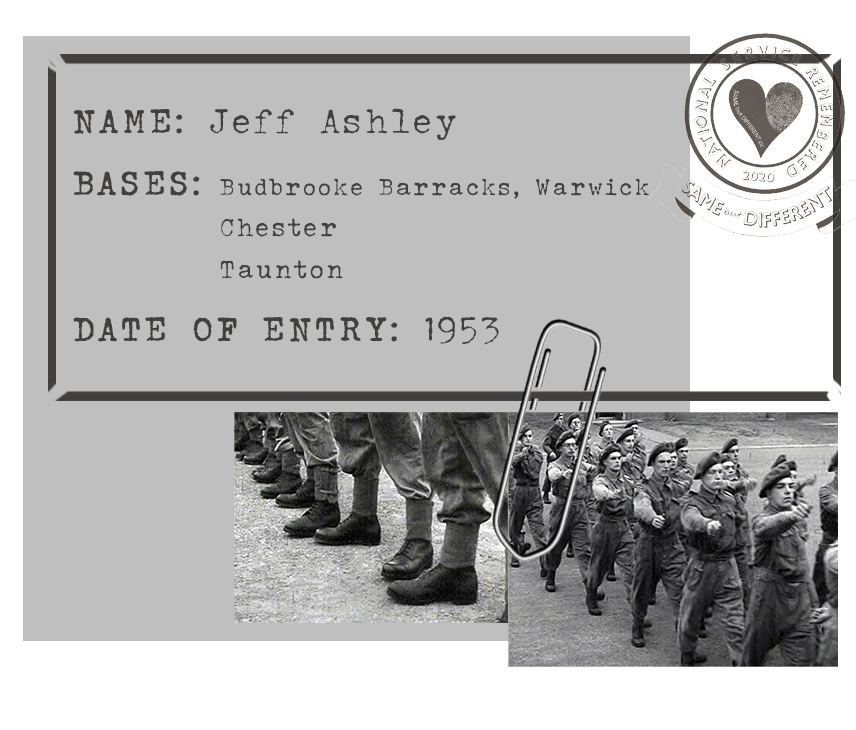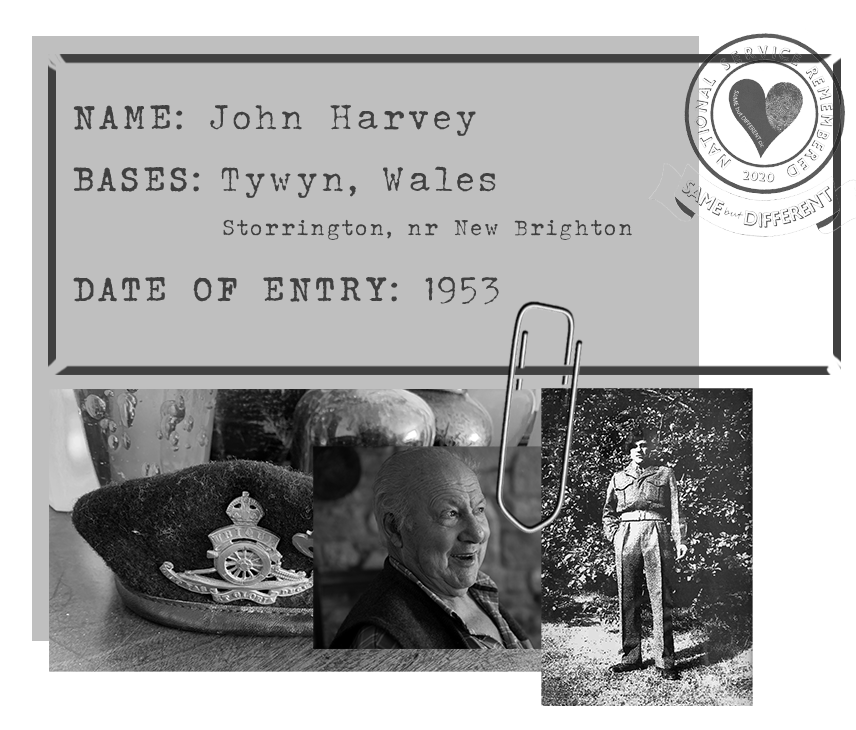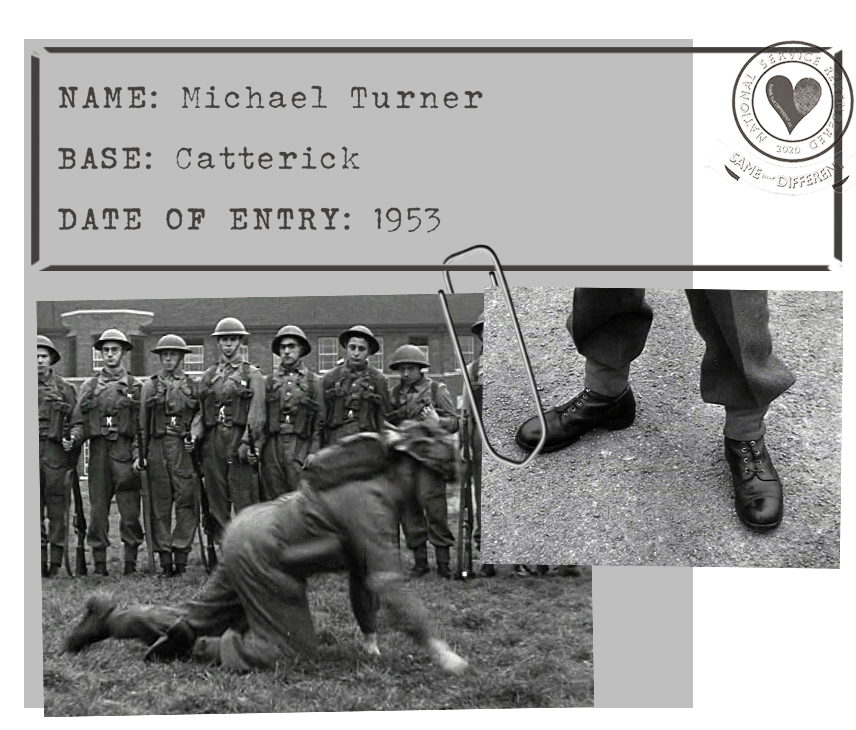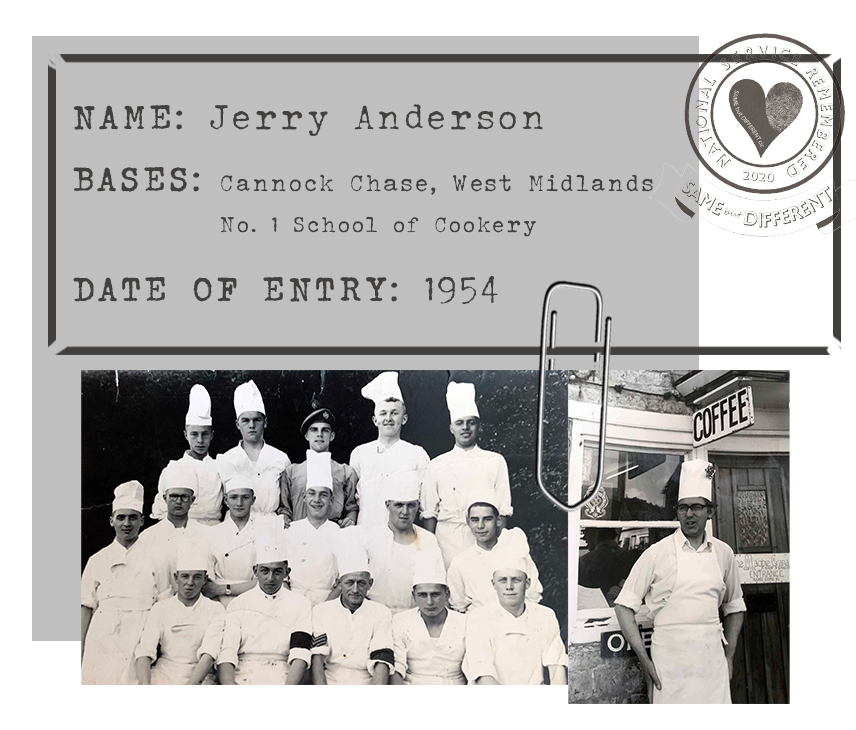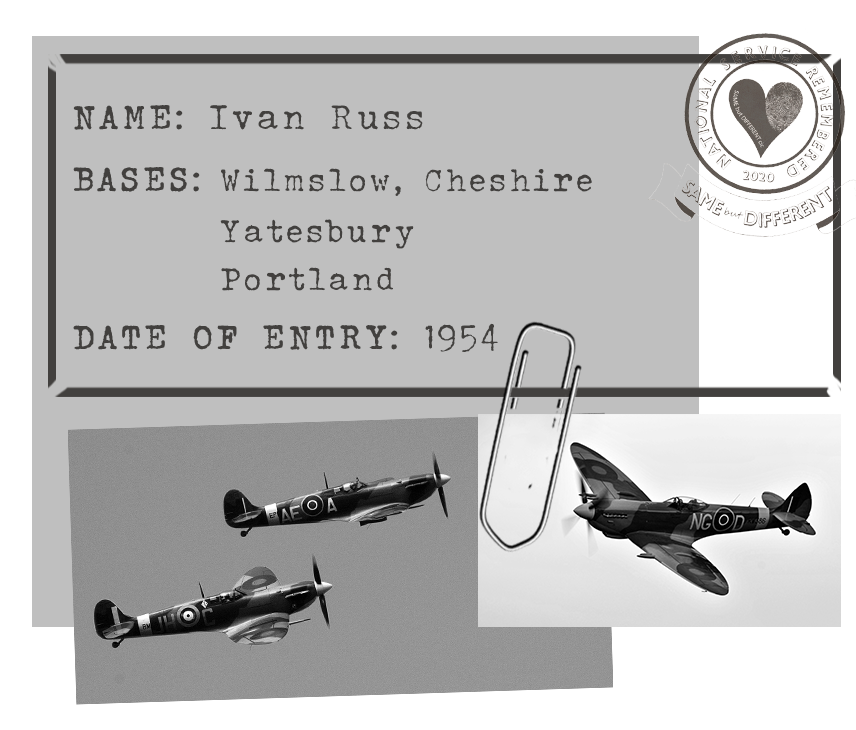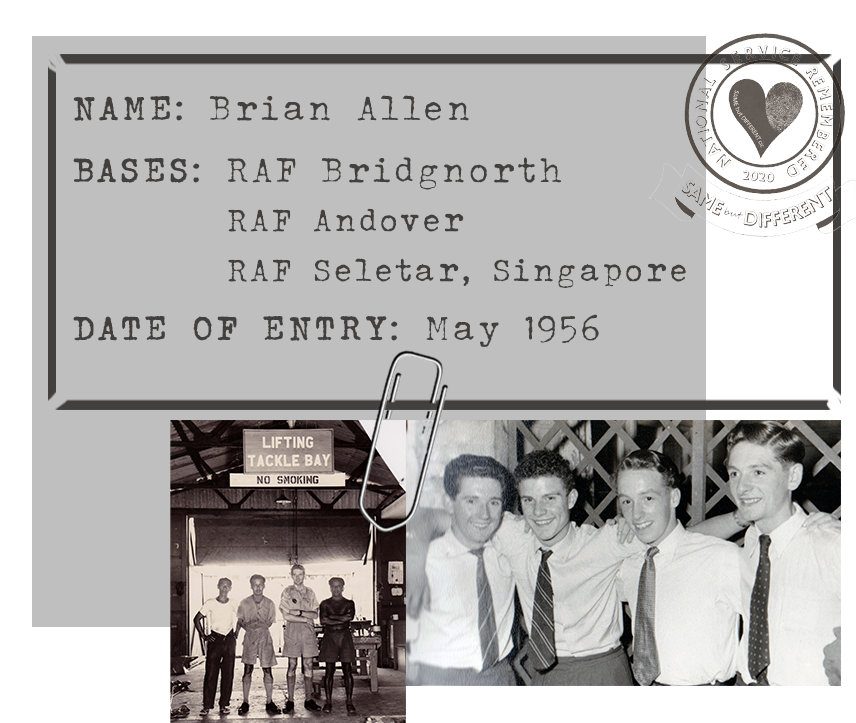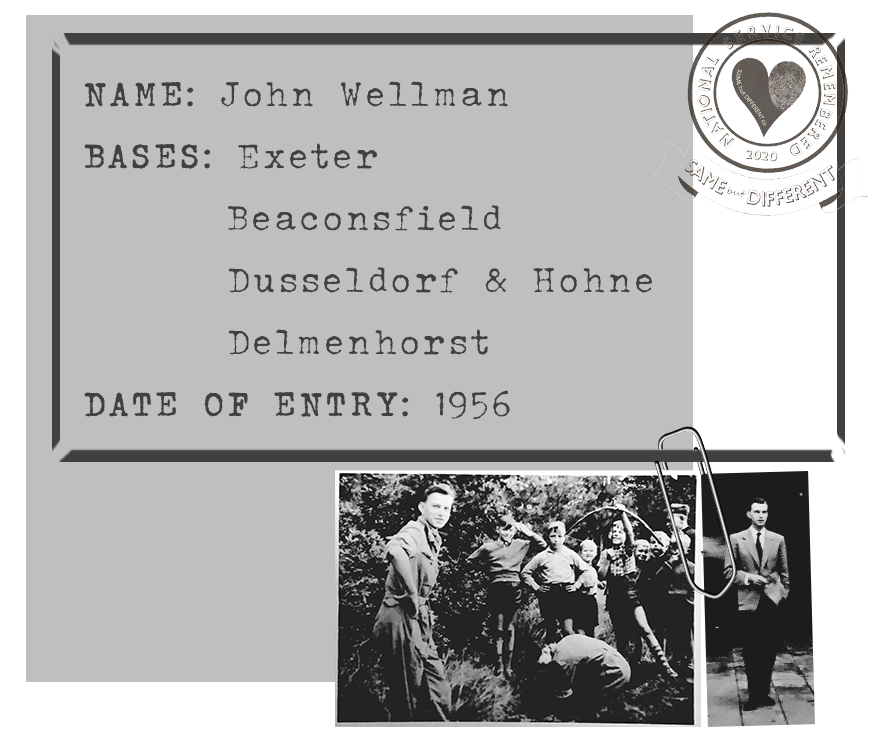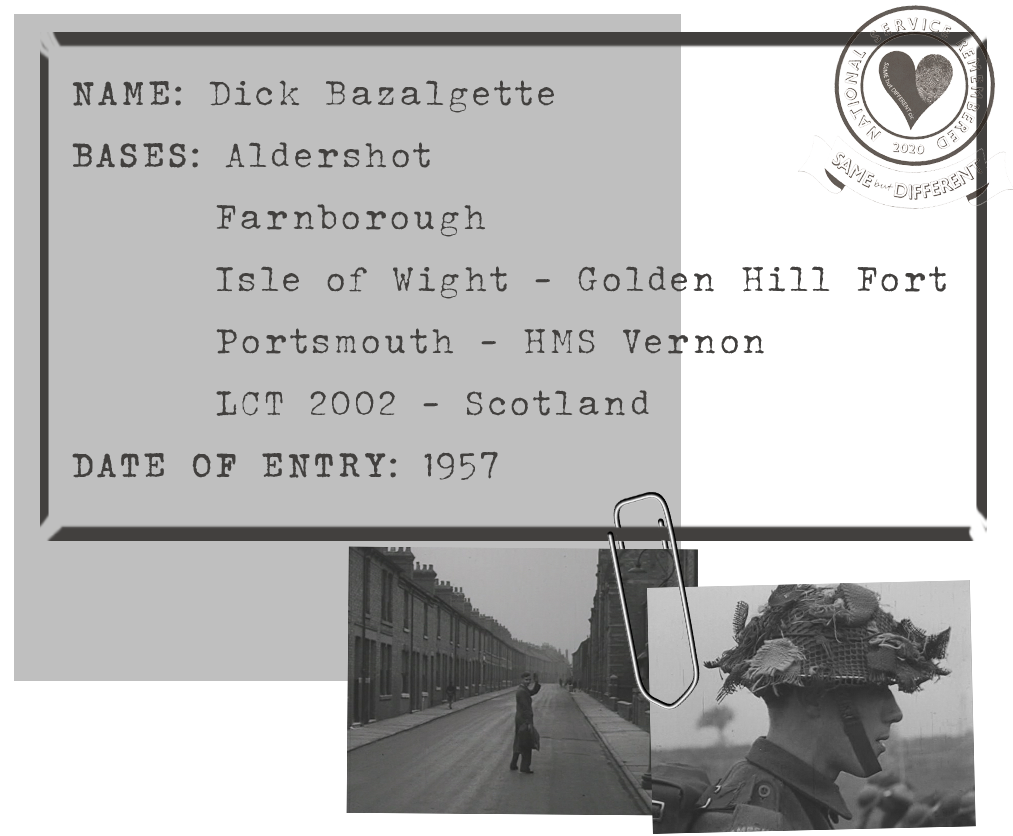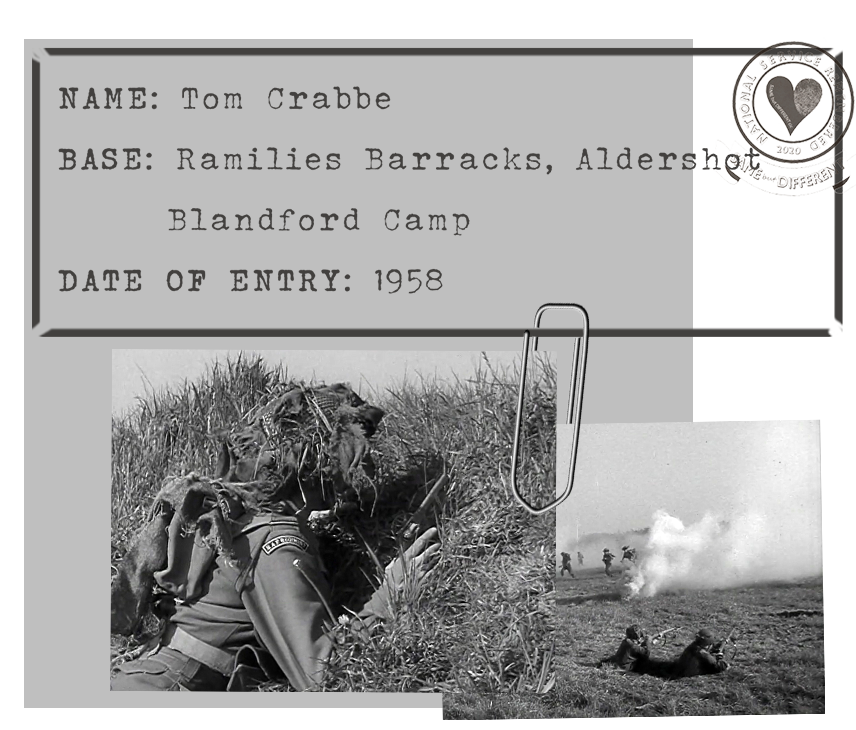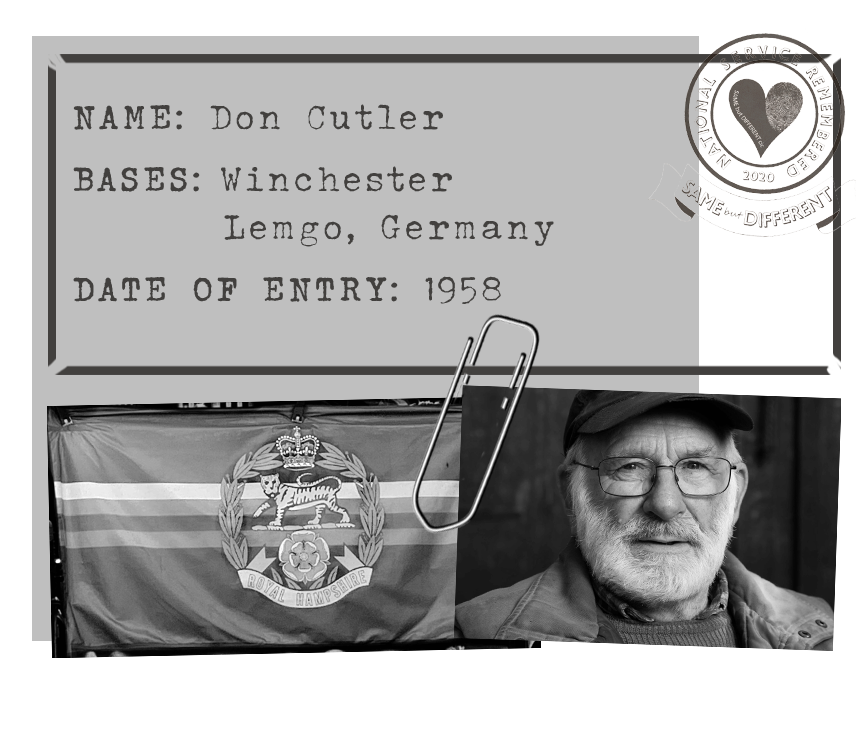In 1953, the war had been over for 8 years but conscription was still in force.
It was possible to obtain deferment for full time study, however, people attending Teacher Training Colleges were obliged to do their National Service. I had a provisional acceptance at the University of London and needed to complete my service ready for September 1955. Consequently, I wrote to the powers that be asking to be called up. To give them their due - I was examined, interviewed and received joining instructions in the space of a week. For me it was to be two years in the army in the wilds of Kent. The Queens Own Royal West Kent Regiment (QORWK) depot was at Maidstone. It is only right to recognise the dedication and patriotism that modern day service personnel display. It is impossible not to respect the pride and sense of belonging that people feel towards a chosen regiment and to be other than deeply moved by the sacrifices made by present day serving personnel. However - I had no such empathy for the QORWK Regiment - I had never heard of them before this! Neither did I have any feeling that "my country needed me". The war was over and gone. The communist insurgence in Malaysia had no relevance to me and did not appear to threaten Britain's security. I felt that National Service was simply an unwelcome interruption to my life and the fact that it was compulsory added to my feeling of resentment. In retrospect, my 2 years in the army was a broadening experience where I matured quite considerably and it did me no harm whatsoever.
I was to report to Maidstone Barracks by 10.00hrs on Wed 3rd September 1953. Enclosed was a postal order for four shillings (20p). How decent I thought, they have sent me money for my train fare. Little did I know that the four shillings was my first 24 hours’ pay! 24 bob a week (£1.20), before stoppages. One of the stoppages was for 'barrack damages' even though no damage had occurred. The net pay was less than a pound (twenty shillings), but all we could buy was tea, buns and cigarettes from the NAAFI, as we were confined to barracks.
“How decent I thought, they have sent me money for my train fare. Little did I know that the four shillings was my first 24 hours’ pay!”
The train from Woolwich Arsenal took me on the North Kent line to Maidstone Barracks. On arrival we had to collect our kit; Mess tins - aluminium - two; these I had come across in the Scouts. But drawers green cellular - three pairs? Or housewives - one? These were mysteries yet to be solved. I came to rather like the comfort of the 'drawers green cellular'. These were cotton boxer shorts and once the drawstring had been replaced by elastic, they were extremely wearable. The ‘housewife’ was a small bundle containing needle, cotton and darning wool. There were cutlery and ammunition pouches (which seemed to be called pooches), a mattress and blankets. These were all piled into our arms and off we marched. We had to parcel up our civilian clothes to be sent home. A 'short back and sides' haircut was particularly galling since civilian fashion was to have rather longer hair. Shaving every day was essential - a popular instruction from a critical NCO was that some recruit should "stand closer to the razor". Such cliches were said with tongue in cheek but always with a straight face. Another favourite was "Am I hurting you?" (No Sergeant) - "Well I should be, I'm standing on your hair - get a haircut". We were assigned to our barrack rooms and issued with our proper uniform which was referred to as our BD, Battle Dress, and Greatcoat (overcoat).
At Wemyss barracks in Canterbury, we formed part of Number 22 Squad, set to begin our basic training along with members of the Middlesex Regiment and Royal Fusiliers.
For room inspections, blankets and sheets were folded into a box shape and kit was set out. The floor was polished using a 'bumper', a weighted flat headed mop. In no circumstances were marks of any sort to be made on the polished floor. "Stand by your beds" was the dreaded order. The NCO in charge and duty officer inspected us, ready to record the name of anyone who was not up to scratch. The officer would hook a boot or a mess tin on the end of his swagger stick and, with a look of disgust, drop it onto the floor or even project it out of the window. This meant that the offending article was not shiny enough or there may have been a speck of dirt on it. We also had to be able to march in three ranks and to salute. Saluting seemed to be of extreme importance. As the saying went "If it moves - move it, if it doesn't move - paint it, and if it moves of its own accord - salute it".
We were then issued with real rifles that fired real bullets! The rifles were the Mk 4 Lee Enfield bolt action models with wooden stock and facility for attaching a bayonet. We fired the .303 rifle, the 3mm Sten gun and a 2" mortar. We had no such luxury of ear protection. The Bren gun is a light machine gun fitted with a tripod and could be set for single shots or continuous fire. We also threw a couple of live hand grenades - very frightening. "Whatever you do - don't drop it" was the warning. I had the sense that the NCO's in charge were just as nervous as we were. And so back to barracks to clean our weapons by pouring hot water through the barrels and pulling through a piece of cloth on a string called, unsurprisingly, a 'pullthro'. Woe betide anyone who had the temerity to pour metal polish down the barrel!
“Saluting seemed to be of extreme importance. As the saying went “If it moves - move it, if it doesn’t move - paint it, and if it moves of its own accord - salute it”.”
By now we were allowed some weekends off.
Hitching home in uniform was fairly easy since drivers seemed to be sympathetic to young servicemen. Once back at Maidstone, we were given a stripe (Lance corporal) and I ended up with a job in the Regimental Police. Anyone less suited would have been difficult to find. I was based in the guard room at the entrance to the camp and checked soldiers coming and going on leave by signing them in or out. The return time was usually 23.59 hours. There was no such time as midnight - either a minute to or a minute past. Occasionally, a sad recruit would be marched at the double into the guardroom for some minor misdemeanour on the parade ground. On one occasion a recruit was brought in by the drill sergeant and set to work to scrub the floor. The lad was clearly upset and I was obliged to supervise his scrubbing. How I wish that I'd had the courage to offer him some sympathy, but I guess that I had been indoctrinated into the system. I was standing on the gate when two private soldiers strolled up. We chatted for a while; they said they were going into town and off they went. Unfortunately, they were guilty of some action "prejudicial to the good order of military discipline" and were on CB (confined to barracks). How was I supposed to know? I was not so naive as to admit having waved them on their way. After a prolonged search, the RSM (a wise old soldier) decided that they had exited through a hole in the wire. I wonder if he had really deduced the truth but decided that discretion was the easiest way forward. In the New Year, the two reappeared and were put under arrest - but not before they had warmly thanked me for allowing them to enjoy a happy family Christmas (and had been primed as to their supposed manner of exit from the camp)!
I had a bunk in one of the barrack rooms allocated to permanent staff and others who were passing through. One such 'passer through' wanted to leave the barracks. He had destroyed most of his kit in an attempt to be discharged, so he couldn’t get past the guard room. He asked me to lend him a pair of boots 'just to go into town'. He took size 9 so I felt safe in pointing out that my boots were only a size 7, but he managed to cram his feet into them. Not only did he get past the guard room but he then 'went absent' - in my highly polished best boots! He was subsequently captured but had once again disposed of his kit. I had to buy myself a new pair of boots - another lesson learned.
I heard that a temporary clerk was needed in the orderly room (the company office).
This sounded like a softer option than regimental police. I became the post clerk, opening the incoming mail and posting the outgoing. Correspondence marked 'Restricted' or 'Secret' arrived in double envelopes; I had to pass the inner envelope directly to the Warrant Officer in Charge. Then the Medical Orderly job came up and I was in the right position to hear about it. With an Ambulance Man badge from the Senior Scouts, the Medical Officer (a National Serviceman himself) decided that I would do. The previous incumbent had had a laidback casual approach which suited me well as a role model. I also took over the accommodation which was a single room attached to the medical centre. I regained my single stripe and became the only Lance Corporal in the place with private quarters - bliss!
Since there was only one medical orderly, the implication was that he/I was permanently on call. Consequently, I could not be available for any other duties - no parades, no guard duties - in fact nothing whatsoever. What a cushy number! Also, of course, being in the medical centre meant that I wore shoes rather than boots and gaiters. Emergencies were extremely rare and apart from inoculations, coughs and colds, blisters and boils were our main concern. Cuts, bruises and athletes foot rash also needed treatment. Just once we had an emergency appendicitis.
“ I regained my single stripe and became the only Lance Corporal in the place with private quarters - bliss!”
Each recruit had to be vaccinated and given a series of injections. A line of young chaps with sleeves rolled up would circulate. The first in the queue got his vaccination and returned to the tail end, when he got to the front again he got his second jab and back to the end again. This process was repeated until they had all been through three times (Tetanus, Typhoid and Smallpox). Very occasionally one would faint - sit him up and give him the next jab! Six weeks later each recruit needed a booster jab. Each syringe held 2 cc (ml) and the first dose was 0.2 cc which meant that ten jabs could be given from each full syringe. The inch and a half long needles were boiled and reused. On one occasion we had a batch of recruits allocated for a Saturday morning (most inconvenient - we normally closed up at noon). The MO had a medical friend staying for the weekend who agreed to help out in order to speed the process. The plan was that I would keep up a supply of filled syringes with a fresh needle, and two lines of recruits would be jabbed (0.2 cc each) by the two doctors. I handed over full syringes. The first recruit on the friend's line got the lot! We kept him in for observation and by Sunday morning there were still no ill effects. I could get away - but I had missed the Saturday evening dance in Woolwich! I learned how to stitch wounds and give injections, and even gave the MO an injection of penicillin into his backside!
Each week we were obliged to attend 'pay parade'.
We lined up and each in turn was called up to the paying officer's desk to collect his meagre pay: stamp to attention, salute and quote the last four digits of our army number, receive the cash and then about turn and move away. Once I had become the medical orderly, these were the only parades I ever attended.
Each time the ambulance was used, a work sheet had to be completed. In practice, since I signed virtually everything which needed the MO's signature, I could effectively call upon the ambulance as I pleased. This did lead to one or two small liberties being taken. The drivers were allowed a limited number of trips which could be classified as "training runs" or "test runs". Thus a trip into Maidstone with a stop off at the swimming pool was an ideal training run. No one ever queried the fact that an army ambulance was occasionally parked in the car park of the swimming pool.
“No one ever queried the fact that an army ambulance was occasionally parked in the car park of the swimming pool.”
During the winter of 1953 floods threatened to overwhelm the East Coast of Britain. We were put on standby in case we had to be called upon for flood relief duties. This meant that originally our Christmas leave was cancelled. However, by Boxing Day the situation was deemed to be less critical and we were allowed to stand down. In fact, the peak of the flood crisis did not occur until the end of January when 24,000 homes were flooded and 307 people lost their lives.
One morning I was woken by what sounded like a series of explosions, followed by the fire brigade. I staggered out of bed and discovered that the hut next door was on fire and well ablaze. The 'explosions' were the sound of the asbestos cement roof disintegrating. The fire brigade won in the end. This may well have been the most exciting and dangerous happening of my two years’ service!
The stated aim of every National Serviceman was to reach the wonderful day of Demob and get back into Civvy Street. I packed my kit-bag, (we were obliged to retain all our kit in readiness for service as a part time territorial), collected my discharge certificate and with a final travel warrant in my hand, made my way in full uniform to Maidstone Barracks railway station for the last time.


